限制性定语从句和非限制性定语从句
- 格式:ppt
- 大小:241.00 KB
- 文档页数:6
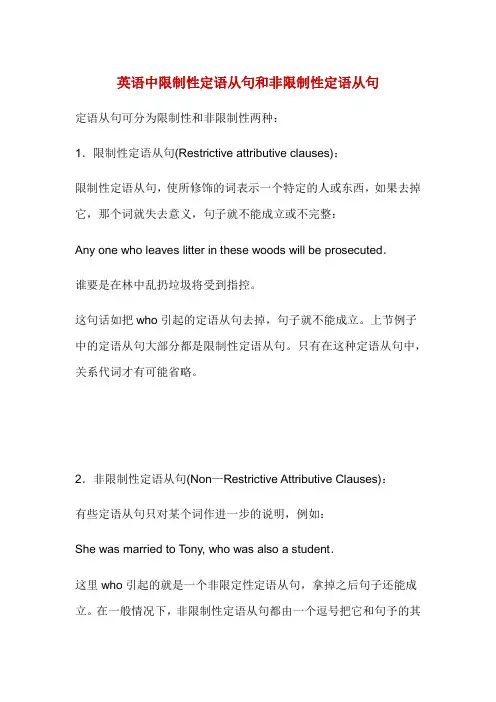
英语中限制性定语从句和非限制性定语从句定语从句可分为限制性和非限制性两种:1.限制性定语从句(Restrictive attributive clauses):限制性定语从句,使所修饰的词表示一个特定的人或东西,如果去掉它,那个词就失去意义,句子就不能成立或不完整:Any one who leaves litter in these woods will be prosecuted.谁要是在林中乱扔垃圾将受到指控。
这句话如把who引起的定语从句去掉,句子就不能成立。
上节例子中的定语从句大部分都是限制性定语从句。
只有在这种定语从句中,关系代词才有可能省略。
2.非限制性定语从句(Non—Restrictive Attributive Clauses):有些定语从句只对某个词作进一步的说明,例如:She was married to Tony, who was also a student.这里who引起的就是一个非限定性定语从句,拿掉之后句子还能成立。
在一般情况下,非限制性定语从句都由一个逗号把它和句予的其它部分分开,在译成汉语时多译成一个并列句。
下面例句中部包含有非限制性定语从句:The note was left by Jim,who was here a moment ago.这个条子是吉姆留的,他刚才来过。
She introduced me to her husband,whom I hadn’t met before.她把我介绍给她丈夫,这人我以前没见过。
This is George,whose class you will be taking.这是乔治,你将接他的班。
I have many friends,some of whom were painters.我有许多朋友,其中有些是画家。
She was very fond of speaking French,which indeed she spoke well.她很喜欢讲法语,而且讲得确实很好。
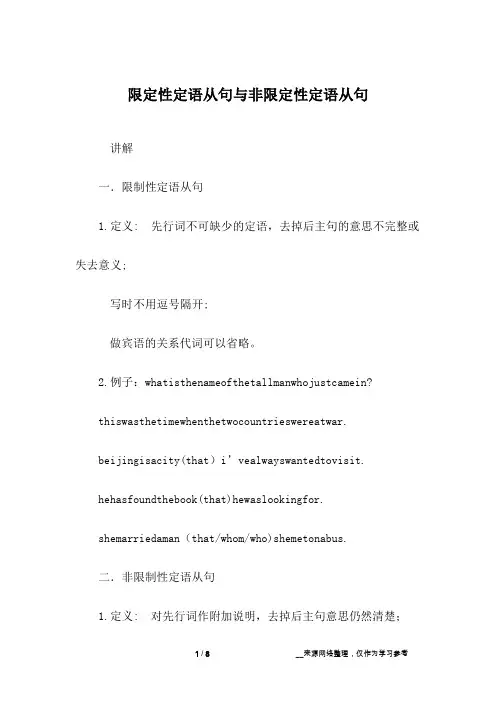
限定性定语从句与非限定性定语从句一.限制性定语从句1.定义:失去意义;;2.例子:whatisthenameofthetallmanwhojustcamein? thiswasthetimewhenthetwocountrieswereatwar.beijingisacity(that)i’vealwayswantedtovisit. hehasfoundthebook(that)hewaslookingfor.shemarriedaman(that/whom/who)shemetonabus.二.非限制性定语从句1.定义:号隔开;that引导,关系词不可省略。
2.例子:beijing,whichisthecapitalofchina,hasaverylonghistory. yesterdayimetliping,whoseemedtobeverybusy.三.注意1.限制性定语从句中,在表示时间、地点的词后,关系副词可以省略.thatwastheyear(when)ifirstwentabroad.weneedaplace(where)wecanstayforafewdays.2.先行词为reason,关系词可用why/forwhich/that.thereasonwhy/forwhich/thatiboughttherosesisthatmarylikesthe m.3.先行词为way,关系词可用that/inwhich/不用关系词thisisthewaythat/inwhich/不填ididit.四.as引导的定语从句1.as引导限制性定语从句thesame...as...和...一样的/such...as...像...之类的aswewantedtofindyesterday.(定语从句)这和我们昨天要找的是同一个人。
(as作宾语)(主句)ashewasthreeyearsago.(定语从句)他和三年前不一样了。
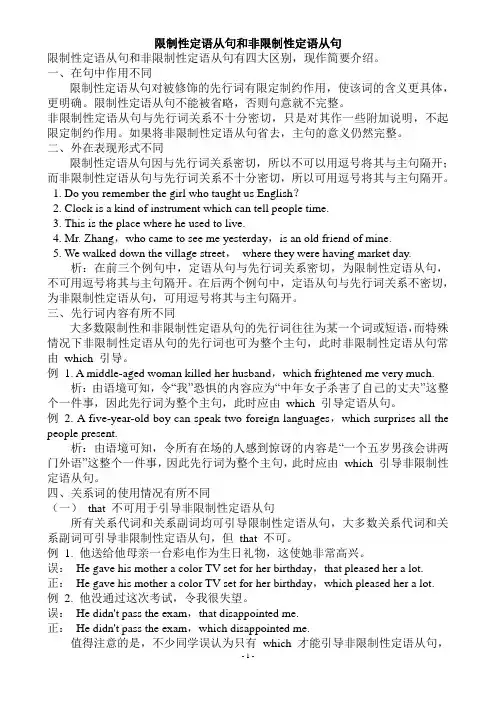
限制性定语从句和非限制性定语从句限制性定语从句和非限制性定语从句有四大区别,现作简要介绍。
一、在句中作用不同限制性定语从句对被修饰的先行词有限定制约作用,使该词的含义更具体,更明确。
限制性定语从句不能被省略,否则句意就不完整。
非限制性定语从句与先行词关系不十分密切,只是对其作一些附加说明,不起限定制约作用。
如果将非限制性定语从句省去,主句的意义仍然完整。
二、外在表现形式不同限制性定语从句因与先行词关系密切,所以不可以用逗号将其与主句隔开;而非限制性定语从句与先行词关系不十分密切,所以可用逗号将其与主句隔开。
1. Do you remember the girl who taught us English?2. Clock is a kind of instrument which can tell people time.3. This is the place where he used to live.4. Mr. Zhang,who came to see me yesterday,is an old friend of mine.5. We walked down the village street,where they were having market day.析:在前三个例句中,定语从句与先行词关系密切,为限制性定语从句,不可用逗号将其与主句隔开。
在后两个例句中,定语从句与先行词关系不密切,为非限制性定语从句,可用逗号将其与主句隔开。
三、先行词内容有所不同大多数限制性和非限制性定语从句的先行词往往为某一个词或短语,而特殊情况下非限制性定语从句的先行词也可为整个主句,此时非限制性定语从句常由which 引导。
例1. A middle-aged woman killed her husband,which frightened me very much.析:由语境可知,令“我”恐惧的内容应为“中年女子杀害了自己的丈夫”这整个一件事,因此先行词为整个主句,此时应由which 引导定语从句。
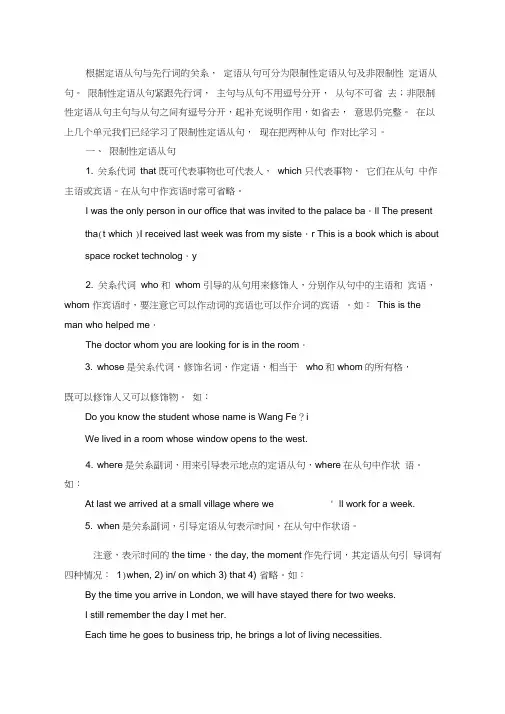
根据定语从句与先行词的关系,定语从句可分为限制性定语从句及非限制性定语从句。
限制性定语从句紧跟先行词,主句与从句不用逗号分开,从句不可省去;非限制性定语从句主句与从句之间有逗号分开,起补充说明作用,如省去,意思仍完整。
在以上几个单元我们已经学习了限制性定语从句,现在把两种从句作对比学习。
一、限制性定语从句1. 关系代词that 既可代表事物也可代表人,which 只代表事物,它们在从句中作主语或宾语。
在从句中作宾语时常可省略。
I was the only person in our office that was invited to the palace ba.ll The presenttha(t which )I received last week was from my siste.r This is a book which is about space rocket technolog.y2. 关系代词who 和whom 引导的从句用来修饰人,分别作从句中的主语和宾语,whom 作宾语时,要注意它可以作动词的宾语也可以作介词的宾语。
如:This is the man who helped me.The doctor whom you are looking for is in the room.3. whose是关系代词,修饰名词,作定语,相当于who和whom的所有格,既可以修饰人又可以修饰物。
如:Do you know the student whose name is Wang Fe?iWe lived in a room whose window opens to the west.4. where是关系副词,用来引导表示地点的定语从句,where在从句中作状语。
如:At last we arrived at a small village where we ' ll work for a week.5. when是关系副词,引导定语从句表示时间,在从句中作状语。
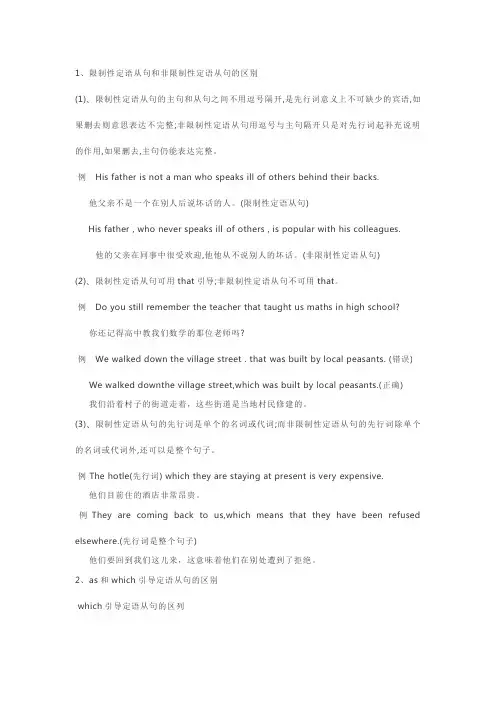
1、限制性定语从句和非限制性定语从句的区别(1)、限制性定语从句的主句和从句之间不用逗号隔开,是先行词意义上不可缺少的宾语,如果删去则意思表达不完整;非限制性定语从句用逗号与主句隔开只是对先行词起补充说明的作用,如果删去,主句仍能表达完整。
例His father is not a man who speaks ill of others behind their backs.他父亲不是一个在别人后说坏话的人。
(限制性定语从句)His father , who never speaks ill of others , is popular with his colleagues.他的父亲在同事中很受欢迎,他他从不说别人的坏话。
(非限制性定语从句)(2)、限制性定语从句可用that引导;非限制性定语从句不可用that。
例Do you still remember the teacher that taught us maths in high school?你还记得高中教我们数学的那位老师吗?例We walked down the village street . that was built by local peasants. (错误) We walked downthe village street,which was built by local peasants.(正确)我们沿着村子的街道走着,这些街道是当地村民修建的。
(3)、限制性定语从句的先行词是单个的名词或代词;而非限制性定语从句的先行词除单个的名词或代词外,还可以是整个句子。
例 The hotle(先行词) which they are staying at present is very expensive.他们目前住的酒店非常昂贵。
例 They are coming back to us,which means that they have been refused elsewhere.(先行词是整个句子)他们要回到我们这儿来,这意味着他们在别处遭到了拒绝。
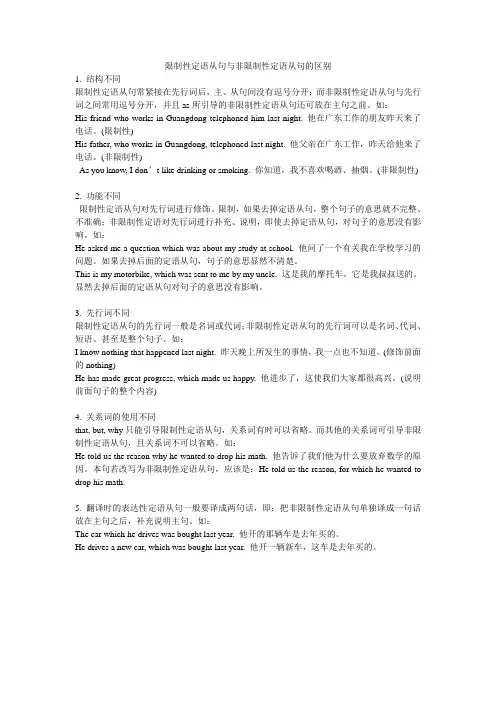
限制性定语从句与非限制性定语从句的区别1. 结构不同限制性定语从句常紧接在先行词后,主、从句间没有逗号分开;而非限制性定语从句与先行词之间常用逗号分开,并且as所引导的非限制性定语从句还可放在主句之前。
如:His friend who works in Guangdong telephoned him last night. 他在广东工作的朋友昨天来了电话。
(限制性)His father, who works in Guangdong, telephoned last night. 他父亲在广东工作,昨天给他来了电话。
(非限制性)As you know, I don’t like drinking or smoking. 你知道,我不喜欢喝酒、抽烟。
(非限制性)2. 功能不同限制性定语从句对先行词进行修饰、限制,如果去掉定语从句,整个句子的意思就不完整、不准确;非限制性定语对先行词进行补充、说明,即使去掉定语从句,对句子的意思没有影响。
如:He asked me a question which was about my study at school. 他问了一个有关我在学校学习的问题。
如果去掉后面的定语从句,句子的意思显然不清楚。
This is my motorbike, which was sent to me by my uncle. 这是我的摩托车,它是我叔叔送的。
显然去掉后面的定语从句对句子的意思没有影响。
3. 先行词不同限制性定语从句的先行词一般是名词或代词;非限制性定语从句的先行词可以是名词、代词、短语、甚至是整个句子。
如:I know nothing that happened last night. 昨天晚上所发生的事情,我一点也不知道。
(修饰前面的nothing)He has made great progress, which made us happy. 他进步了,这使我们大家都很高兴。
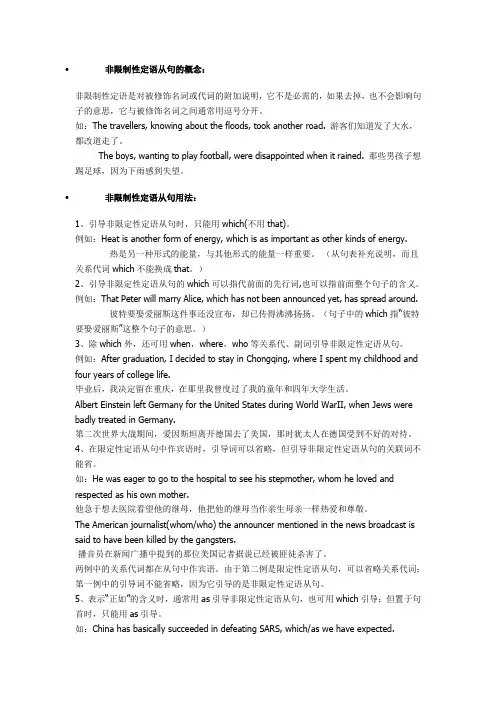
∙非限制性定语从句的概念:非限制性定语是对被修饰名词或代词的附加说明,它不是必需的,如果去掉,也不会影响句子的意思,它与被修饰名词之间通常用逗号分开。
如:The travellers, knowing about the floods, took another road. 游客们知道发了大水,都改道走了。
The boys, wanting to play football, were disappointed when it rained. 那些男孩子想踢足球,因为下雨感到失望。
∙非限制性定语从句用法:1、引导非限定性定语从句时,只能用which(不用that)。
例如:Heat is another form of energy, which is as important as other kinds of energy.热是另一种形式的能量,与其他形式的能量一样重要。
(从句表补充说明,而且关系代词which不能换成that。
)2、引导非限定性定语从句的which可以指代前面的先行词,也可以指前面整个句子的含义。
例如:That Peter will marry Alice, which has not been announced yet, has spread around.彼特要娶爱丽斯这件事还没宣布,却已传得沸沸扬扬。
(句子中的which指“彼特要娶爱丽斯”这整个句子的意思。
)3、除which外,还可用when,where,who等关系代、副词引导非限定性定语从句。
例如:After graduation, I decided to stay in Chongqing, where I spent my childhood and four years of college life.毕业后,我决定留在重庆,在那里我曾度过了我的童年和四年大学生活。
Albert Einstein left Germany for the United States during World WarII, when Jews were badly treated in Germany.第二次世界大战期间,爱因斯坦离开德国去了美国,那时犹太人在德国受到不好的对待。
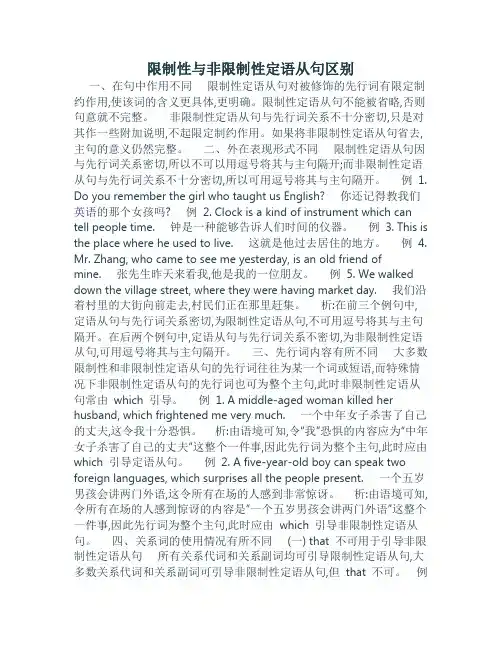
限制性与非限制性定语从句区别一、在句中作用不同限制性定语从句对被修饰的先行词有限定制约作用,使该词的含义更具体,更明确。
限制性定语从句不能被省略,否则句意就不完整。
非限制性定语从句与先行词关系不十分密切,只是对其作一些附加说明,不起限定制约作用。
如果将非限制性定语从句省去,主句的意义仍然完整。
二、外在表现形式不同限制性定语从句因与先行词关系密切,所以不可以用逗号将其与主句隔开;而非限制性定语从句与先行词关系不十分密切,所以可用逗号将其与主句隔开。
例1. Do you remember the girl who taught us English?你还记得教我们英语的那个女孩吗?例2. Clock is a kind of instrument which can tell people time.钟是一种能够告诉人们时间的仪器。
例3. This is the place where he used to live.这就是他过去居住的地方。
例4. Mr. Zhang, who came to see me yesterday, is an old friend of mine.张先生昨天来看我,他是我的一位朋友。
例5. We walked down the village street, where they were having market day.我们沿着村里的大街向前走去,村民们正在那里赶集。
析:在前三个例句中,定语从句与先行词关系密切,为限制性定语从句,不可用逗号将其与主句隔开。
在后两个例句中,定语从句与先行词关系不密切,为非限制性定语从句,可用逗号将其与主句隔开。
三、先行词内容有所不同大多数限制性和非限制性定语从句的先行词往往为某一个词或短语,而特殊情况下非限制性定语从句的先行词也可为整个主句,此时非限制性定语从句常由which 引导。
例1. A middle-aged woman killed her husband, which frightened me very much.一个中年女子杀害了自己的丈夫,这令我十分恐惧。
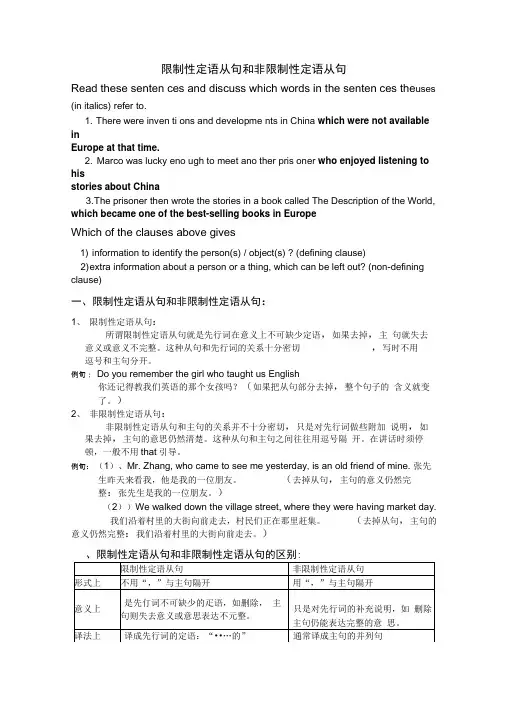
限制性定语从句和非限制性定语从句Read these senten ces and discuss which words in the senten ces the uses (in italics) refer to.1. There were inven ti ons and developme nts in China which were not available inEurope at that time.2. Marco was lucky eno ugh to meet ano ther pris oner who enjoyed listening to hisstories about China3. T he prisoner then wrote the stories in a book called The Description of the World, which became one of the best-selling books in EuropeWhich of the clauses above gives1) information to identify the person(s) / object(s) ? (defining clause)2) e xtra information about a person or a thing, which can be left out? (non-defining clause)一、限制性定语从句和非限制性定语从句:1、限制性定语从句:所谓限制性定语从句就是先行词在意义上不可缺少定语,如果去掉,主句就失去意义或意义不完整。
这种从句和先行词的关系十分密切,写时不用逗号和主句分开。
例句:Do you remember the girl who taught us English你还记得教我们英语的那个女孩吗?(如果把从句部分去掉,整个句子的含义就变了。
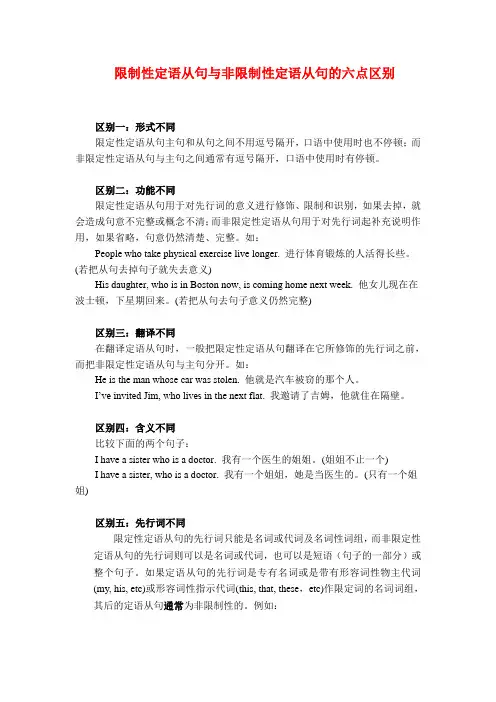
限制性定语从句与非限制性定语从句的六点区别区别一:形式不同限定性定语从句主句和从句之间不用逗号隔开,口语中使用时也不停顿;而非限定性定语从句与主句之间通常有逗号隔开,口语中使用时有停顿。
区别二:功能不同限定性定语从句用于对先行词的意义进行修饰、限制和识别,如果去掉,就会造成句意不完整或概念不清;而非限定性定语从句用于对先行词起补充说明作用,如果省略,句意仍然清楚、完整。
如:People who take physical exercise live longer. 进行体育锻炼的人活得长些。
(若把从句去掉句子就失去意义)His daughter, who is in Boston now, is coming home next week. 他女儿现在在波士顿,下星期回来。
(若把从句去句子意义仍然完整)区别三:翻译不同在翻译定语从句时,一般把限定性定语从句翻译在它所修饰的先行词之前,而把非限定性定语从句与主句分开。
如:He is the man whose car was stolen. 他就是汽车被窃的那个人。
I’ve invited Jim, who lives in the next flat. 我邀请了吉姆,他就住在隔壁。
区别四:含义不同比较下面的两个句子:I have a sister who is a doctor. 我有一个医生的姐姐。
(姐姐不止一个)I have a sister, who is a doctor. 我有一个姐姐,她是当医生的。
(只有一个姐姐)区别五:先行词不同限定性定语从句的先行词只能是名词或代词及名词性词组,而非限定性定语从句的先行词则可以是名词或代词,也可以是短语(句子的一部分)或整个句子。
如果定语从句的先行词是专有名词或是带有形容词性物主代词(my, his, etc)或形容词性指示代词(this, that, these,etc)作限定词的名词词组,其后的定语从句通常为非限制性的。
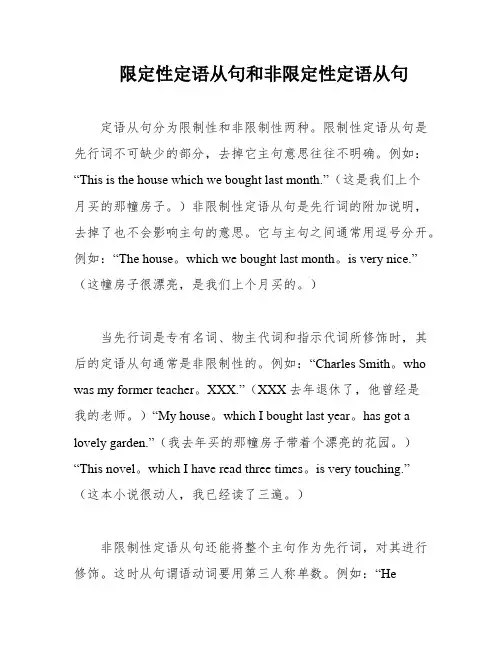
限定性定语从句和非限定性定语从句定语从句分为限制性和非限制性两种。
限制性定语从句是先行词不可缺少的部分,去掉它主句意思往往不明确。
例如:“This is the house which we bought last month.”(这是我们上个月买的那幢房子。
)非限制性定语从句是先行词的附加说明,去掉了也不会影响主句的意思。
它与主句之间通常用逗号分开。
例如:“The house。
which we bought last month。
is very nice.”(这幢房子很漂亮,是我们上个月买的。
)当先行词是专有名词、物主代词和指示代词所修饰时,其后的定语从句通常是非限制性的。
例如:“Charles Smith。
who was my former teacher。
XXX.”(XXX去年退休了,他曾经是我的老师。
)“My house。
which I bought last year。
has got a lovely garden.”(我去年买的那幢房子带着个漂亮的花园。
)“This novel。
which I have read three times。
is very touching.”(这本小说很动人,我已经读了三遍。
)非限制性定语从句还能将整个主句作为先行词,对其进行修饰。
这时从句谓语动词要用第三人称单数。
例如:“Heseems not to have grasped what I XXX。
XXX.”(他似乎没抓住我的意思,这使我心烦。
)“Liquid water changes to vapor。
which is called XXX.”(液态水变为蒸汽,这就叫做蒸发。
)需要注意的是,关系代词that和关系副词why不能引导非限制性定语从句。
限定性定语从句与非限定性定语从句的区别在于,限定性定语从句不能省略,如果省略整个句子意思不完整。
而非限定性定语从句可以省略,如果省略整个句子意思仍然完整。
限制性和非限制性定语从句定语从句是英语中一种重要的修饰语结构,分为限制性定语从句和非限制性定语从句。
它们分别在句子中起到不同的作用,需要注意其使用方式和语法规则。
一、限制性定语从句限制性定语从句是对名词进行修饰并且对其起到限制作用的从句。
它在句子中起到必要的信息补充和说明的作用,如果去掉该从句,句子的意思就不完整或不准确。
限制性定语从句通常没有逗号与主句分开,并且无法省略其中任何成分。
例句1:The book that I bought yesterday is very interesting.翻译:我昨天买的那本书非常有趣。
在这个例句中,定语从句"that I bought yesterday"对名词"book"进行了限制,并且在这里是必不可少的,因为如果去掉该定语从句,句子的意思就变得不明确。
例句2:The girl who is standing by the window is my sister.翻译:站在窗户旁边的那个女孩是我的姐姐。
在这个例句中,定语从句"who is standing by the window"对名词"girl"进行了限制,并且同样起到了必不可少的作用。
二、非限制性定语从句非限制性定语从句是对名词进行修饰但不对其起到限制作用的从句。
它提供的是额外的、非必需的信息,如果去掉该从句,句子的意思仍然完整。
非限制性定语从句通常用逗号与主句分开,并且可以在不影响整个句子结构的情况下省略其中部分成分。
例句3:John, who is my best friend, is coming to visit me tomorrow.翻译:明天我最好的朋友约翰要来看我了。
在这个例句中,定语从句"who is my best friend"对名词"John"进行了修饰,但不是必需的信息。
定语从句的限制性与非限制性定语从句是英语语法中常见的句子结构,用来修饰名词或代词。
根据其在句子中的作用,定语从句又可以分为限制性定语从句和非限制性定语从句。
本文将详细讨论这两种类型的定语从句。
一、限制性定语从句限制性定语从句是指对先行词进行了必要的限制和具体化,它提供了对先行词的进一步描述。
句中的限制性定语从句不可省略,否则会影响句子的完整性和表达的准确性。
限制性定语从句通常不用逗号与主句隔开。
限制性定语从句可以使用"that"或者省略关系代词的形式来引导。
例如:1. The book that I borrowed from the library is very interesting.(我从图书馆借来的那本书非常有趣。
)2. The girl you met yesterday is my neighbor.(你昨天碰到的那个女孩是我邻居。
)在以上两个例句中,定语从句分别对"book"和"girl"进行了具体化和限制,使得句子的意思更加明确。
二、非限制性定语从句非限制性定语从句是指对先行词进行了进一步的补充说明,但不是对先行词的限制和界定。
与限制性定语从句不同的是,非限制性定语从句是可省略的,省略后句子仍然能够保持完整。
非限制性定语从句通常用逗号与主句隔开,有时也可以用逗号加关系代词来引导。
例如:1. My sister, who is a doctor, lives in London.(我姐姐是个医生,住在伦敦。
)2. John and Mary, who are good friends, are going on a trip together.(约翰和玛丽是好朋友,他们要一起去旅行。
)在以上两个例句中,非限制性定语从句对"my sister"和"John and Mary"进行了进一步的说明,而不是对它们进行了限制。
限制性定语从句与非限制性定语从句区别限制性定语从句和非限制性定语从句是英语语法中两个常见的修饰方式,它们在使用时有着明显的区别。
本文将从结构、用途以及标点方面来详细探讨这两者之间的区别。
一、结构区别限制性定语从句是相对较为简洁的从句,它通常用来对先行词进行必要的限定和说明,去除了该从句对主句的某种修饰信息,整个句子也能够保持完整的意义。
限制性定语从句没有逗号与主句隔开,且无法省略。
例如:1. The book that I bought yesterday is on the table.(我昨天买的那本书在桌子上。
)在上述例句中,“that I bought yesterday”是一个限制性定语从句,修饰先行词“book”。
如果去除这个从句,则句子变为“The book is on the table.”(那本书在桌子上),这个句子的意义和完整性就会丧失。
非限制性定语从句较为独立,它用于对先行词进行额外的说明和补充,但去掉后不会对句子整体造成影响。
非限制性定语从句通常用逗号与主句隔开,在语法上并非必需部分。
例如:1. Tom, who is my best friend, is coming to visit tomorrow.(汤姆,我的好朋友,明天要来访问。
)在上述例句中,“who is my best friend”是一个非限制性定语从句,对先行词“Tom”进行了额外的说明。
即使去掉这个从句,句子仍然完整并且意义明确。
二、用途区别限制性定语从句通常用来对先行词进行修饰和限定,没有它的话,句子的意义就不完整或者模糊。
它提供了限定先行词的关键信息,使读者或者听者能够准确地理解句子的含义。
非限制性定语从句则是对先行词进行额外说明补充,提供了一些有关先行词的附加信息,但去掉后不会影响整个句子的意义。
三、标点区别限制性定语从句和非限制性定语从句的标点使用也有着明显的区别。
限制性定语从句通常没有逗号,与主句紧密相连,形成一个完整的句子。